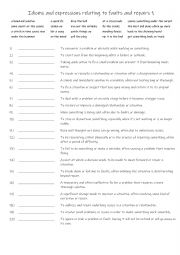
|
B1+-C1 Idioms and expressions relating to faults and repairs 1
First, students need to familiarise themselves with the 20 idioms and expressions and their meanings. Then they read the definitions to see which one is being described and write that word in the space provided Answers on page 2.
Level: intermediate
Age: 12-100
Type:
Downloads: 116
|
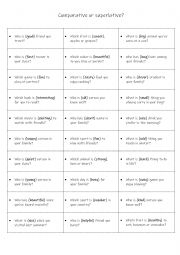
|
Comparative or superlative sentence practise 2 B
This worksheet is suitable for CEFR A2 level students. A 30 generic question worksheet using the same adjectives in worksheet 2 A.Students reinforce the comparative or superlative grammar part with a speaking component.
Level: elementary
Age: 9-100
Type:
Downloads: 103
|
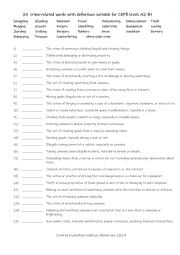
|
Match the crime words to their definitions
25 crime-related words with definitions suitable for CEFR levels A2-B1
Level: intermediate
Age: 12-100
Type: worksheet
Downloads: 109
|
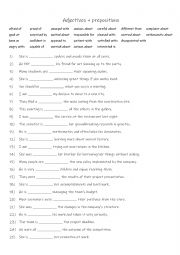
|
B1-B2 25 adjectives + prepositions practise
Learning adjectives with prepositions is important because it helps improve fluency, accuracy, and comprehension in English. Many adjectives require specific prepositions to form grammatically correct phrases (e.g., "afraid of", "interested in"). Understanding these combinations helps students express themselves clearly and naturally. Different pre...
Level: intermediate
Age: 9-100
Type:
Downloads: 125
|
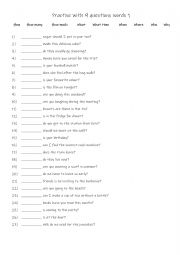
|
Practise with 9 questions words 1
Students familiarise themselves with the 9 question words and their use. Then they read the questions to see which question word is required to complete the questions. Answers on page 2.
Level: elementary
Age: 7-100
Type:
Downloads: 103
|
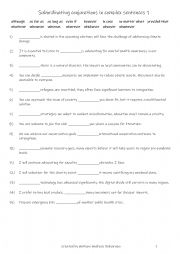
|
B1+-B2 15 subordinating conjunctions in complex sentences part 1
Using subordinating conjunctions allows students to express more detailed and nuanced thoughts. For instance, "although" and "even if" help convey contrast or condition in sophisticated ways. They add variety to writing and speaking, moving beyond simple sentences and making communication more engaging and dynamic. For example, "whenever" or "whoev...
Level: intermediate
Age: 10-100
Type:
Downloads: 112
|
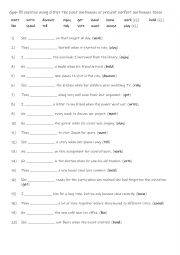
|
A2+-B1 Gap-fill exercise using either the past continuous or present perfect continuous tense
Students read the sentences and complete the gap-fill with either the past continuous or present perfect continuous tense using the key words.Answers on page 2.
Level: intermediate
Age: 10-100
Type:
Downloads: 111
|
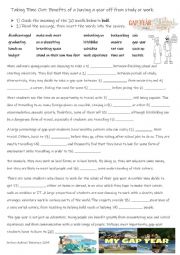
|
Taking Time Out: Benefits of a taking a year off from study or work!
340-Word reading article with a 20-word gap fill exercise about having a gap year. It takes an in-depth look at the benefits to both the individual�s independence, well-being and of other countries and its inhabitants.This sheet is suitable for higher level A2 to B1 students of all ages. An answer sheet is included. For higher level students they c...
Level: elementary
Age: 12-100
Type: worksheet
Downloads: 1932
|
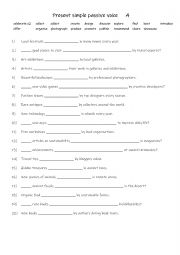
|
Present simple passive voice 4
Learning the present simple passive voice helps students focus on the action or the recipient, rather than the doer. It�s useful when the doer is unknown, unimportant, or to emphasize the object. Mastering this structure improves clarity, variety in sentence construction, and is essential for formal or academic communication. Students complete the ...
Level: elementary
Age: 9-100
Type:
Downloads: 126
|
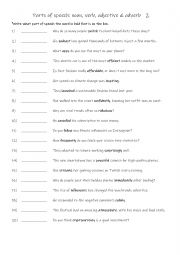
|
Parts of speech noun, verb, adjective & adverb 2
Learning parts of speech�nouns, verbs, adjectives, and adverbs�is essential because they are the foundation of English grammar. Mastering them helps students build grammatically correct sentences, communicate more effectively, expand their vocabulary, improve reading comprehension, and perform better in exams and writing tasks. Answers on page 2.
Level: elementary
Age: 8-100
Type:
Downloads: 107
|












